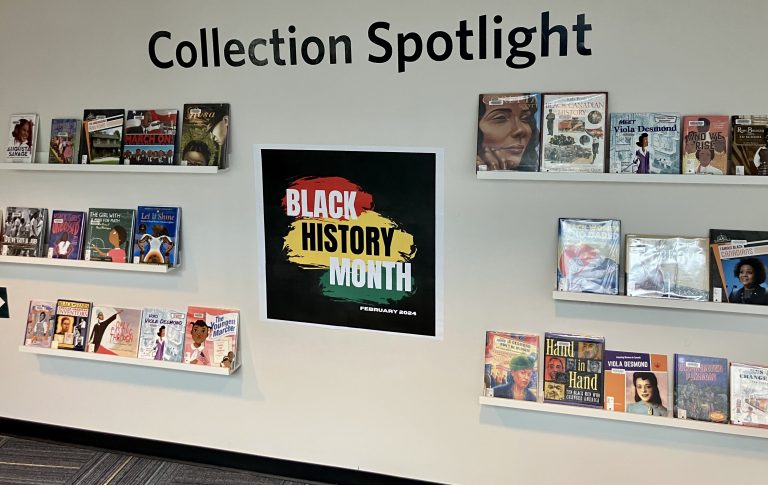Every February, as we celebrate Black History Month, we honor the important contributions of Black Canadians and African Americans throughout history. From innovators and artists to scientists and educators, this month provides us with the opportunity to recognize some of the most influential figures.
Let us use Black History Month as a chance to reflect on how far we have come while also committing ourselves to continue the fight for racial equity and justice.
Please enjoy browsing this selection of children’s books and teacher resources. These books and more are on display at the UBC Education Library Collection Spotlight area on our main floor breezeway.
Click on the title or photo for more information:
Picture Books and Juvenile Non-Fiction
 Curve & flow: the elegant vision of L.A. architect Paul R. Williams
Curve & flow: the elegant vision of L.A. architect Paul R. Williams
written by Andrea J. Loney; illustrated by Keith Mallett.
NA737.W527 L66 2022
“As an orphaned Black boy growing up in Los Angeles in the early 1900s, Paul R. Williams became obsessed with the concept of ‘home.’ He not only dreamed of building his own home, he turned those dreams into drawings.
Defying the odds and breaking down the walls of racism, Williams was able to curve around the obstacles in his way to become a world-renowned architect, designing homes for the biggest celebrities of the day…while creating a number of Los Angeles historic landmarks and thousands of private and public buildings across the United States.”– Front jacket flap.
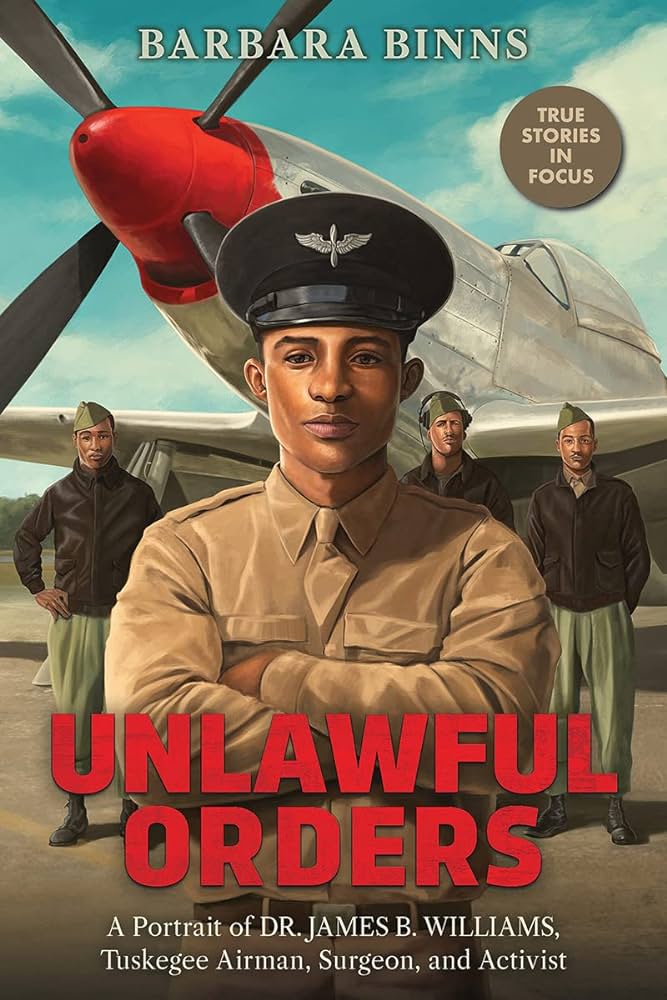 Unlawful orders: a portrait of Dr. James B. Williams, Tuskegee airman, surgeon, and activist
Unlawful orders: a portrait of Dr. James B. Williams, Tuskegee airman, surgeon, and activist
Barbara Binns.
D790.253 477th .B56 2022
“The Tuskegee Airmen heroically fought for the right to be officers of the US military so that they might participate in World War II by flying overseas to help defeat fascism. However, after winning that battle, they faced their next great challenge at Freeman Field, Iowa, where racist white officers barred them from entering the prestigious Officers’ Club that their rank promised them. The Freeman Field Mutiny, as it became known, would eventually lead to the desegregation of the US armed forces, forever changing the course of American history and race relations. One Black officer who refused to give in to the bigotry at Freeman Field was James Buchanan “JB” Williams. JB grew up the son of sharecroppers, but his loving family and insuppressible intellect drove him to push boundaries placed on Black Americans in the early twentieth century. JB’s devotion to the betterment of others took him from the classroom where he learned to be a doctor, to serving as a medic in the US military and eventually joining the elite Tuskegee Airmen, where he fought to change the minds of all who believed Black men couldn’t make good soldiers. But JB’s greatest contribution came in his role as doctor and Civil Rights activist after the war, where he continued to push past injustices placed on Black Americans. Critically acclaimed author Barbara Binns tells the story of one man’s remarkable life, and in doing so, explores the trials of the brave Black freedom fighters who defended the world against racism and bigotry, both on the front lines and at home”– Provided by publisher
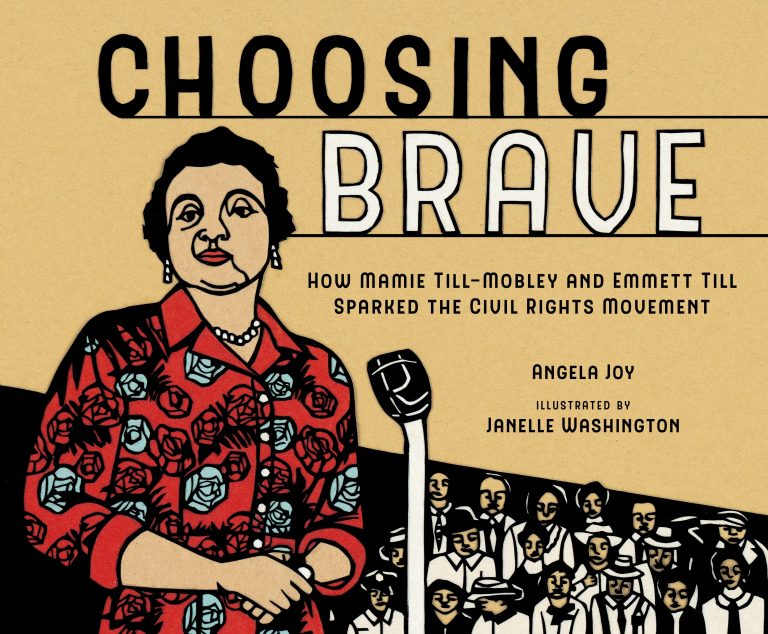 Choosing brave: how Mamie Till-Mobley and Emmett Till sparked the civil rights movement
Choosing brave: how Mamie Till-Mobley and Emmett Till sparked the civil rights movement
Angela Joy; illustrated by Janelle Washington.
E185.97.T546 J69 2022
Mamie Till-Mobley is the mother of Emmett Till, the 14-year-old boy who was brutally murdered while visiting the South in 1955. His death became a rallying point for the civil rights movement, but few know that it was his mother who was the catalyst for bringing his name to the forefront of history.
In Choosing Brave, Angela Joy and Janelle Washington offer a testament to the power of love, the bond of motherhood, and one woman’s unwavering advocacy for justice. It is a poised, moving work about a woman who refocused her unimaginable grief into action for the greater good. Mamie fearlessly refused to allow America to turn away from what happened to her only child. She turned pain into change that ensured her son’s life mattered.
Timely, powerful, and beautifully told, this thorough and moving story has been masterfully crafted to be both comprehensive and suitable for younger readers.
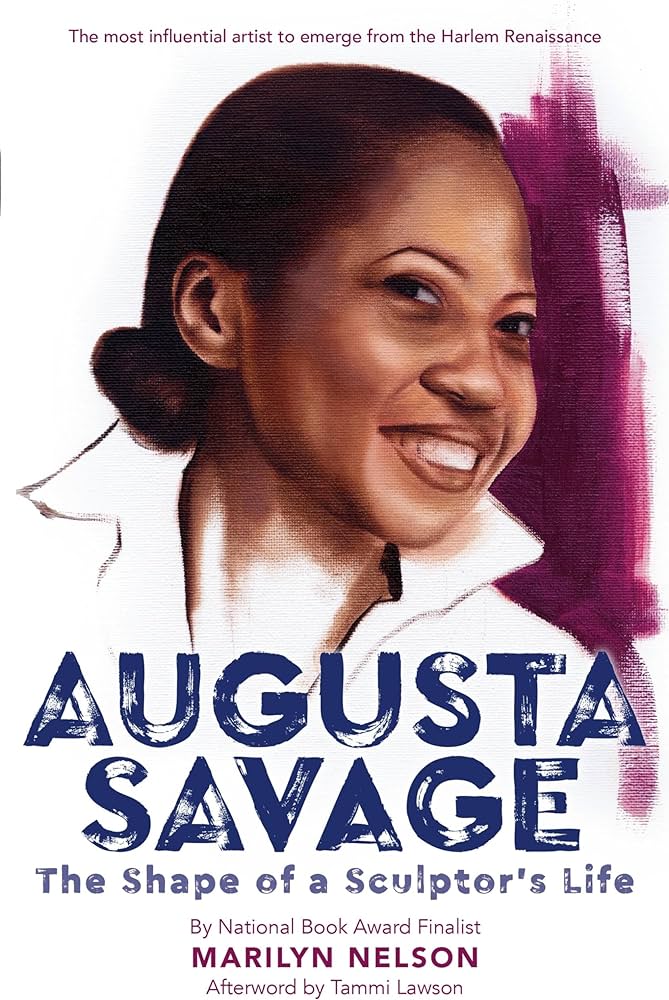 Augusta Savage: the shape of a sculptor’s life
Augusta Savage: the shape of a sculptor’s life
Marilyn Nelson ; afterword by Tammi Lawson.
PS3573.A4795 A94 2022
“A powerful biography in poems about Augusta Savage, the trailblazing artist and pillar of the Harlem Renaissance-with an afterword by the curator of the Schomburg Center for Research in Black Culture”– Provided by publisher
Augusta Savage was arguable the most influential American artist of the 1930s. A gifted sculptor, she flourished during the Harlem Renaissance and became a teacher to an entire generation of African American artists. Nelson’s poems are paired with photographs of Savage’s work, and photographs from her life.
The result is an important portrait of an exceptional artist who, despite the limitations she faced, was compelled to forge a life through art and creativity. — adapted from jacket and perusal of book
.
 Viola Desmond
Viola Desmond
Becky Noelle; content consultant, Christopher Stuart Taylor, PhD.
FC2346.26.D48 N64 2022
Discusses the life of Viola Desmond, the first Black woman in Canada to challenge racial segregation in court after being fined for sitting in the wrong section of a movie theatre.
.
.
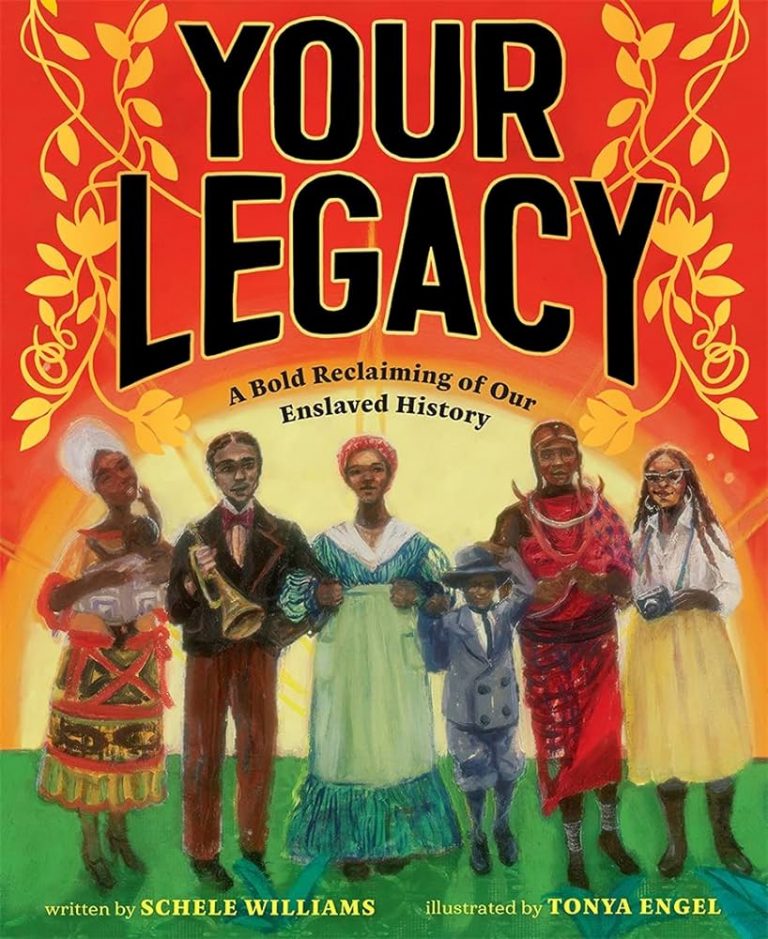 Your legacy : a bold reclaiming of our enslaved history
Your legacy : a bold reclaiming of our enslaved history
written by Schele Williams; illustrated by Tonya Engel.
E185 .W717 2021
“Your story begins in Africa. Your African ancestors defied the odds and survived 400 years of slavery in America and passed down an extraordinary legacy to you.
Beginning in Africa before 1619, Your Legacy presents an unprecedentedly accessible, empowering, and proud introduction to African American history for children.
While your ancestors’ freedom was taken from them, their spirit was not; this book celebrates their accomplishments, acknowledges their sacrifices, and defines how they are remembered-and how their stories should be taught”
— Provided by publisher.
.
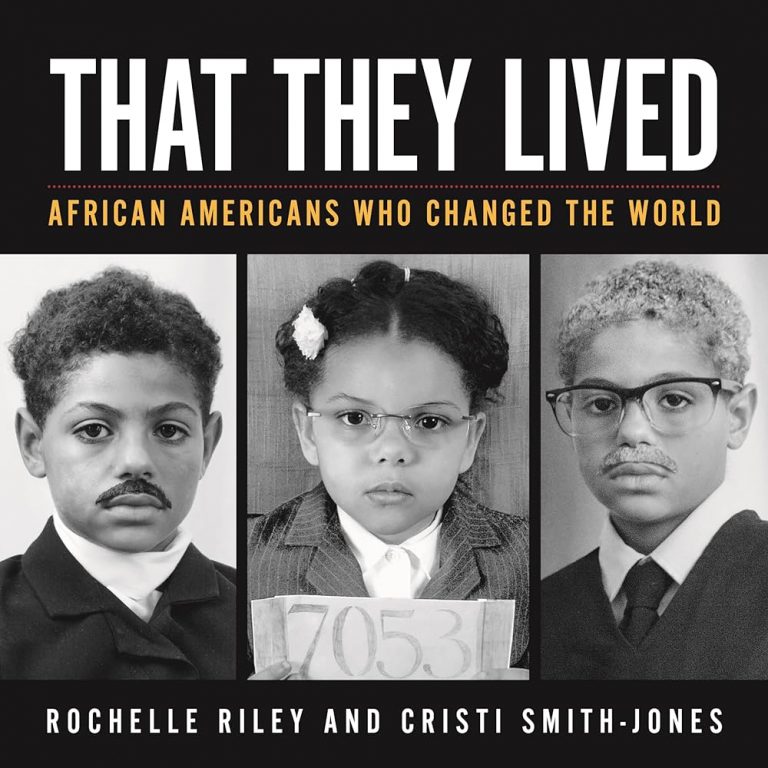 That they lived: African Americans who changed the world
That they lived: African Americans who changed the world
Rochelle Riley and Cristi Smith-Jones.
E185.96 .R55 2021
“That They Lived: African Americans Who Changed the World features Riley’s grandson, Caleb, and Lola photographed in timeless black and white, dressed as important individuals such as business owners, educators, civil rights leaders, and artists, alongside detailed biographies that begin with the figures as young children who had the same ambitions, fears, strengths, and obstacles facing them that readers today may still experience. Muhammad Ali’s bike was stolen when he was twelve years old and the police officer he reported the crime to suggested he learn how to fight before he caught up with the thief. Bessie Coleman, the first African American female aviator, collected and washed her neighbors’ dirty laundry so she could raise enough money for college. When Duke Ellington was seven years old, he preferred playing baseball to attending the piano lessons his mom had arranged. That They Lived fills in gaps in the history that American children have been taught for generations. For African American children, it will prove that they are more than descendants of the enslaved. For all children, it will show that every child can achieve great things and work together to make the world a better place for all.”–Google Books.
 Nina: a story of Nina Simone
Nina: a story of Nina Simone
words by Traci N. Todd; pictures by Christian Robinson.
ML3930.S553 T64 2021
A 2022 Coretta Scott King Book Award Honoree!
This luminous, defining picture book biography illustrated by Caldecott Honoree Christian Robinson, tells the remarkable and inspiring story of acclaimed singer Nina Simone and her bold, defiant, and exultant legacy.
Born Eunice Kathleen Waymon in small town North Carolina, Nina Simone was a musical child. She sang before she talked and learned to play piano at a very young age. With the support of her family and community, she received music lessons that introduced her to classical composers like Bach who remained with her and influenced her music throughout her life. She loved the way his music began softly and then tumbled to thunder, like her mother’s preaching, and in much the same way as her career. During her first performances under the name of Nina Simone her voice was rich and sweet but as the Civil Rights Movement gained steam, Nina’s voice soon became a thunderous roar as she raised her voice in powerful protest in the fight against racial inequality and discrimination.
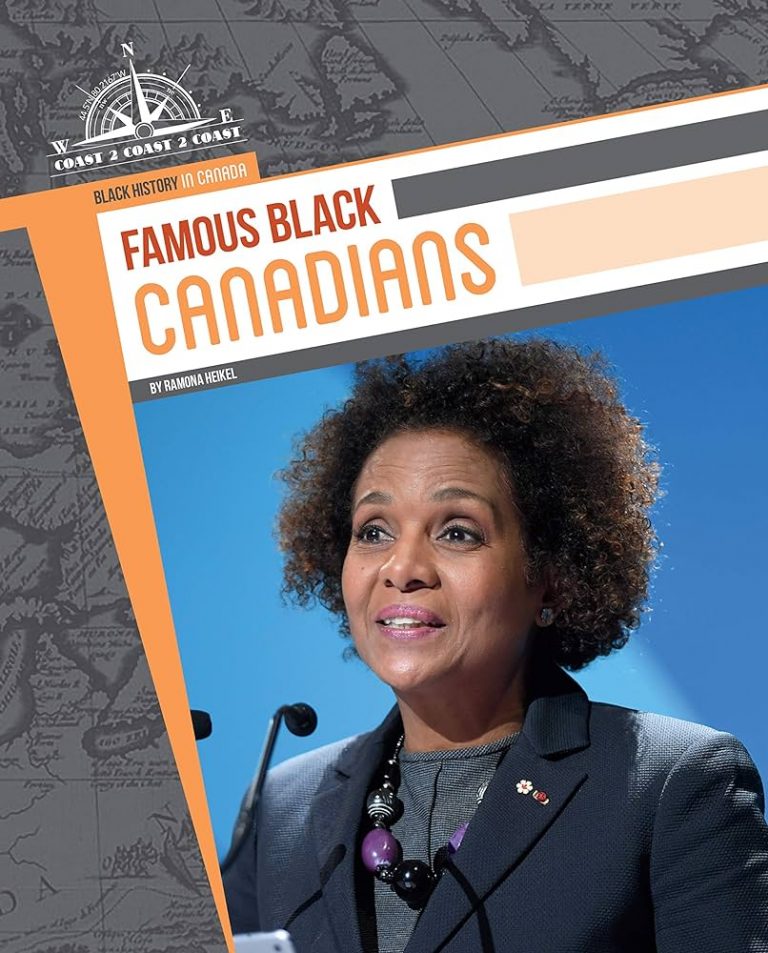 Famous Black Canadians
Famous Black Canadians
by Ramona Heikel.
FC106.B6 H45 2020
Black Canadians have shaped Canadian history since it was first colonized.
Black History in Canada explores the struggles many early black settlers faced and how black Canadians have fought throughout history for equal treatment.
Readers will learn about the important contributions black Canadians have made from their initial arrival in colonial times through the present day.
Discusses the life and accomplishments of Black Canadians from Canada’s earliest days to the present, exploring the struggles that many early settlers faced, and the continuing struggle for equal treatment.
.
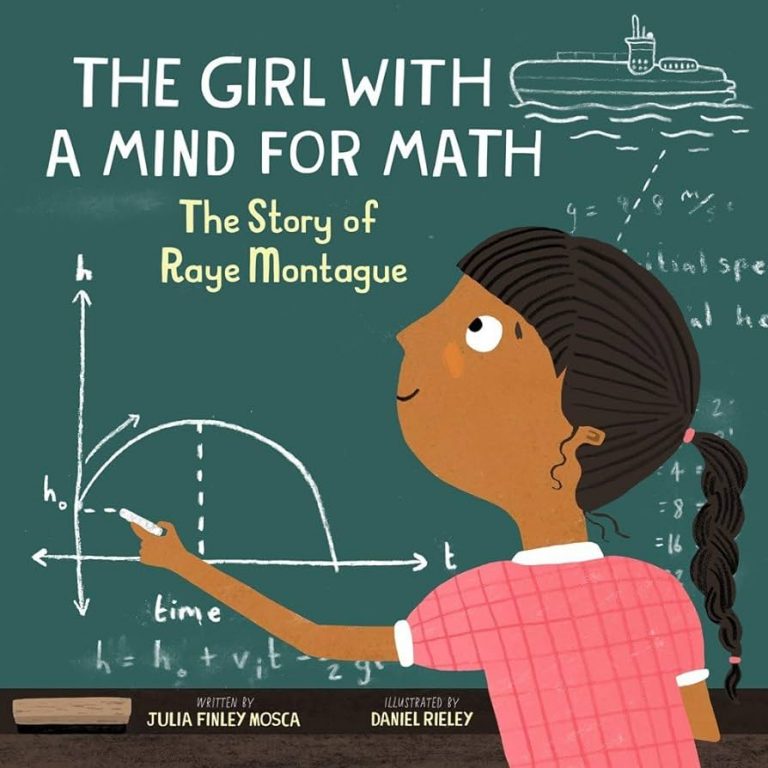 The girl with a mind for math: the story of Raye Montague
The girl with a mind for math: the story of Raye Montague
written by Julia Finley Mosca; illustrated by Daniel Rieley.
VM139 .M68 2018
This is a rhyming-text picture book about Raye Montague. After touring a German submarine in the early 1940s, young Raye set her sights on becoming an engineer. Little did she know sexism and racial inequality would challenge that dream every step of the way, even keeping her greatest career accomplishment a secret for decades. Through it all, the gifted mathematician persisted– finally gaining her well-deserved title in history: a pioneer who changed the course of ship design forever.–Dust jacket.
.
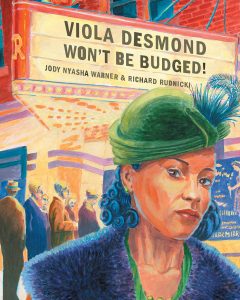 Viola Desmond won’t be budged!
Viola Desmond won’t be budged!
Jody Nyasha Warner; pictures by Richard Rudnicki.
FC2346.26.D48 W37 2010
Tells the story of Viola Desmond, an African Canadian woman who, in 1946, challenged a Nova Scotia movie theater’s segregation policy by refusing to move from her seat to an upstairs section designated for use by blacks.
“Jody Nyasha Warner and Richard Rudnicki’s rendering of Desmond’s tale is a wonderful marriage of text and image. Warner uses a warm oral storytelling voice that invites the reader to “come on here, listen in close” to the tale of a woman who “sat down for her rights.” Rudnicki’s bright illustrations capture the changing emotions on Viola’s face while supplying details of architecture and fashion that bring the period vividly to life.” Quill & Quire
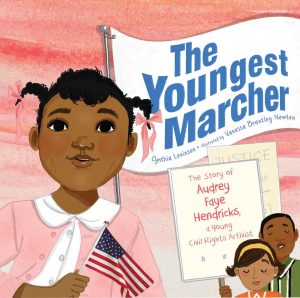 The youngest marcher: the story of Audrey Faye Hendricks, a young civil rights activist
The youngest marcher: the story of Audrey Faye Hendricks, a young civil rights activist
Cynthia Levinson; illustrated by Vanessa Brantley Newton.
F334.B653 H465 2017
Meet the youngest known child to be arrested for a civil rights protest in Birmingham, Alabama, 1963, in this picture book that proves you’re never too little to make a difference. Nine-year-old Audrey Faye Hendricks intended to go places and do things like anybody else. So when she heard grown-ups talk about wiping out Birmingham’s segregation laws, she spoke up. As she listened to the preacher’s words, smooth as glass, she sat up tall. And when she heard the plan — picket those white stores! March to protest those unfair laws! Fill the jails! — she stepped right up and said, I’ll do it! She was going to j-a-a-il!
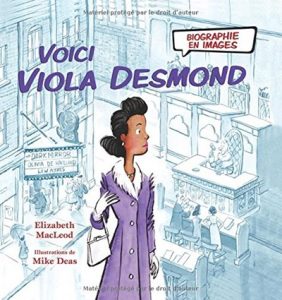 Voici Viola Desmond
Voici Viola Desmond
Elizabeth MacLeod; illustrations de Mike Deas; texte français
de Louise Binette.
FC2346.26.D48 M3414 2018
Faites la rencontre de Viola Desmond, entrepreneure et véritable pionnière en matière d’égalité raciale au Canada.
Par un jour pluvieux de novembre 1946, Viola, de passage à Glasgow en Nouvelle-Écosse, décide d’aller au cinéma. Elle s’installe dans la section officieusement réservée aux Blancs, mais l’ouvreuse lui demande de changer de place. Viola refuse, car elle sait que c’est à cause de la couleur de sa peau. La police l’emmène de force. Viola est emprisonnée, jugée et déclarée coupable. Cela ne l’empêche pas, avec l’aide de ses partisans, de continuer à se battre pour la justice sociale.
Bien qu’elle ait ultimement perdu sa cause devant la Cour suprême, elle fut une pionnière pour les premiers militants des droits civils. Grâce au travail acharné de sa sour Wanda qui s’est battue pour que son héritage soit reconnu à sa juste valeur, le portrait de Viola figurera sur les nouveaux billets de 10$ canadiens.
 Meet Viola Desmond
Meet Viola Desmond
Elizabeth MacLeod; illustrated by Mike Deas.
FC2346.26.D48 M34 2018
Meet Viola Desmond, community leader and early civil rights trailblazer!
On the night of November 8th 1946, Nova Scotia businesswoman Viola Desmond stood up for her right to be in the “unofficial” whites-only section of a New Glasgow movie theatre. and was arrested for it. Supported by the Nova Scotia Association for the Advancement of Coloured People (NSCAACP) and the black-owned newspaper The Clarion, Viola took her quest for the right to freedom from discrimination to the courts. While she ultimately did not succeed, she was a beacon to other early civil-rights activists. Her sister Wanda worked hard to promote Viola’s legacy, which has been finally honoured by Viola’s inclusion on the new Canadian $10 bill.
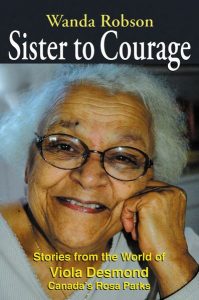 Sister to courage: stories from the world of Viola Desmond, Canada’s Rosa Parks
Sister to courage: stories from the world of Viola Desmond, Canada’s Rosa Parks
Wanda Robson with Ronald Caplan.
FC106B6 eBook ONLINE
In Sister to Courage, Wanda takes us inside the world she shared with Viola and ten other brothers and sisters. Through touching and often hilarious stories, she traces the roots of courage and ambition, god fun and dignity, of the household that produced Viola Desmond.
Tough and compassionate, Viola shines through beyond the moment she was carried out of Roseland movie theatre for refusing to sit I the blacks-only section. Viola emerges as a defender of family and a successful entrepreneur whose momentum was blocked by racism.
With honesty and wit, Wanda Robson Tells her own brave story, giving new life to two remarkable women.
.
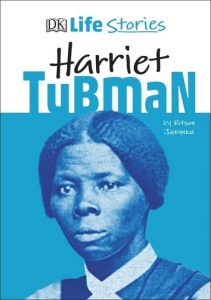 Harriet Tubman
Harriet Tubman
Kit Jazynka; illustrated by Charlotte Ager.
E444.T82 J39 2019
In this kids’ biography, discover the inspiring story of Harriet Tubman, a fearless activist and abolitionist who helped free many slaves.
Born into slavery in c.1820, Harriet Tubman would later run away and help scores of other African American slaves escape to freedom in the North using the “Underground Railroad.” A nurse, scout, and advisor during the American Civil War, Harriet co-led the Combahee River Raid, in which 700 slaves were liberated. After the war, Harriet became involved in women’s suffrage, or the right to vote, and opened a retirement home for sick and elderly African Americans. In this biography book for 8-11 year olds, learn all about Harriet Tubman’s fascinating life, the hardships she endured, her visions, the people she helped and rescued, the battles she fought, and how this American icon of justice and strength continues to inspire so many people today.
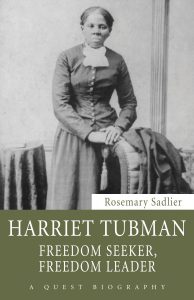 Harriet Tubman: freedom seeker, freedom leader
Harriet Tubman: freedom seeker, freedom leader
Rosemary Sadlier.
E444.T82 eBook ONLINE
Born in the United States and enslaved as a child, Harriet Tubman (circa 1820-1913) is one of the best-known figures connected to the Underground Railroad. Through her knowledge and outdoor survival skills, honed through her unpaid labour in the fields and through the later connections she made in the abolitionist community, Tubman was well poised to command her followers. By her discipline and example, she never lost a “passenger.”
Tubman’s exploits helped to empower those opposed to slavery and enrage those who supported it. Her success encouraged enslaved Africans to make the brave break for freedom and reinforced the belief held by abolitionists in the potential of black freedom and independence. Referred to as “General Tubman” due to her contributions to the Underground Railroad and to the Union Army, Tubman’s numerous rescue missions ending in Canada helped to build the interest in escape and reinforce the position of Canada as the final stop on the journey to freedom.
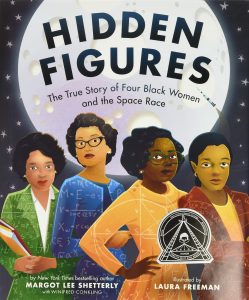 Hidden figures: the true story of four Black women and the space race
Hidden figures: the true story of four Black women and the space race
Margot Lee Shetterly with Winifred Conkling; illustrated by Laura Freeman.
QA27.5 .S548 2018
Explores the previously uncelebrated but pivotal contributions of NASA’s African American women mathematicians to America’s space program, describing how Jim Crow laws segregated them despite their groundbreaking successes. Includes biographies on Dorothy Jackson Vaughan (1910-2008), Mary Winston Jackson (1921-2005), Katherine Colman Goble Johnson (1918- ), Dr. Christine Mann Darden (1942- ).
Katherine, Dorothy, Mary, and Christine were all good at math. Really good. And it was their understanding of numbers that helped them do what seemed impossible. They were women, and they were African-American, and they lived during a time when being black and a woman limited what they could do. But Katherine, Dorothy, Mary, and Christine were hardworking and persistent and, most important, smart. And that’s why NASA hired them to do the math that would one day send the United States into space for the very first time. New York Times bestselling author Margot Lee Shetterly and illustrator Laura Freeman bring to life the inspiring story of the struggles of these four “hidden figures” and what they overcame to succeed. The math work they did would change not only their own lives, but the face of air and space travel forever. — From dust jacket.
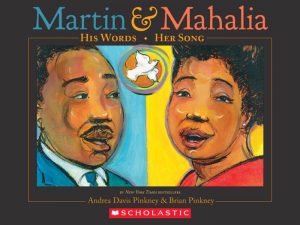 Martin & Mahalia: his words, her song
Martin & Mahalia: his words, her song
Andrea Davis Pinkney; illustrated by Brian Pinkney.
E185.97.K5 P54 2013
On August 28, 1963, Martin Luther King, Jr. gave his famous “I Have a Dream” speech from the steps of the Lincoln Memorial, and his strong voice and powerful message were joined and lifted in song by world-renowned gospel singer Mahalia Jackson. It was a moment that changed the course of history and is imprinted in minds forever. Told through Andrea Davis Pinkney’s poetic prose and Brian Pinkney’s evocative illustration, the stories of these two powerful voices and lives are told side-by-side — as they would one day walk — following the journey from their youth to a culmination at this historical event when they united as one and inspiring kids to find their own voices and speak up for what is right.
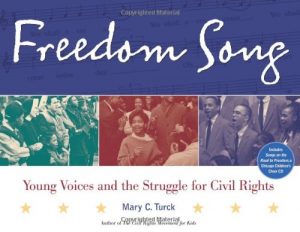 Freedom song: young voices and the struggle for civil rights
Freedom song: young voices and the struggle for civil rights
Mary C. Turck.
E185.61 .T845 2009
Melding memorable music and inspiring history, Freedom Song presents a fresh perspective on the civil rights movement by showing how songs of hope, faith, and freedom strengthened the movement and served as its voice.
In this eye-opening account, you’ll discover how churches and other groups–from the SNCC Freedom Singers to the Chicago Children’s Choir–transformed music both religious and secular into electrifying anthems that furthered the struggle for civil rights.
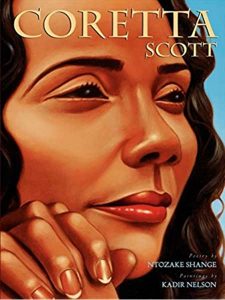 Coretta Scott
Coretta Scott
poetry by Ntozake Shange; paintings by Kadir Nelson
E185.97.K47 S53 2009
Walking many miles to school in the dusty road, young Coretta knew, too well, the unfairness of life in the segregated south.
A yearning for equality began to grow.
Together with Martin Luther King, Jr., she gave birth to a vision and a journey—with dreams of freedom for all.
This extraordinary union of poetic text by Ntozake Shange and monumental artwork by Kadir Nelson captures the movement for civil rights in the United States and honors its most elegant inspiration, Coretta Scott.
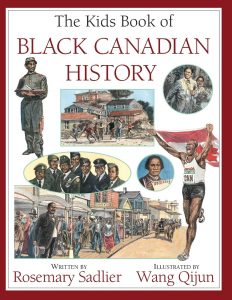 The Kids Book of Black Canadian History
The Kids Book of Black Canadian History
Rosemary Sadlier; illustrated by Wang Qijun.
FC106.B6 S22 2003
From the first Black person who came to Canada about 400 years ago to the most recent wave of African immigrants, Black Canadians have played an important role in our country’s history.
In this informative overview, kids will discover the inspiring stories and events of a people who fought oppression as they searched for a place to call their own.
Featuring fact boxes, mini-profiles, a timeline and more, this book in the acclaimed Kids Book of series offers a glimpse into an often-overlooked part of Canadian history.
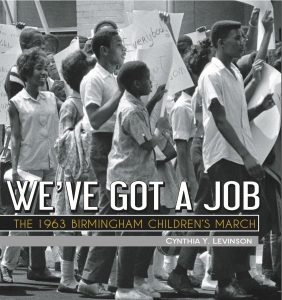 We’ve got a job: the 1963 Birmingham Children’s March
We’ve got a job: the 1963 Birmingham Children’s March
Cynthia Levinson.
F334.B69 N4476 2012
The inspiring story of one of the greatest moments in civil rights history as seen through the eyes of four young people who were at the center of the action.
The 1963 Birmingham Children’s March was a turning point in American history. In the streets of Birmingham, Alabama, the fight for civil rights lay in the hands of children like Audrey Hendricks, Wash Booker, James Stewart, and Arnetta Streeter.
Through the eyes of these four protesters and others who participated, We’ve Got a Job tells the little-known story of the 4,000 black elementary, middle, and high school students who voluntarily went to jail between May 2 and May 11, 1963. The children succeeded – where adults had failed – in desegregating one of the most racially violent cities in America.
By combining in-depth, one-on-one interviews and extensive research, author Cynthia Levinson recreates the events of the Birmingham Children’s March from a new and very personal perspective.
 The Underground Railroad
The Underground Railroad
Rachel Seigel.
FC106.B6 S45 2020
Discusses the development of the Underground Railroad used by escaped slaves to travel north to freedom.
Also discusses the challenges faced by these Black settlers after reaching Canada.
.
.
.
Teacher Resources
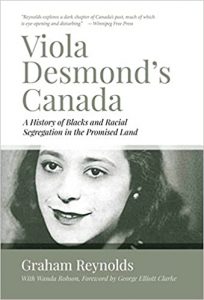 • Viola Desmond’s Canada: a history of blacks and racial segregation in the promised land
• Viola Desmond’s Canada: a history of blacks and racial segregation in the promised land
Graham Reynolds; with Wanda Robson.
FC106.B6 R49 2016
In 1946, a Black Halifax businesswoman, Viola Desmond, was wrongfully arrested for sitting in a white’s-only section of a movie theatre in New Glasgow, Nova Scotia. In 2010, sixty-four years later, the Nova Scotia government recognized this gross miscarriage of justice and posthumously granted her a free pardon. Most Canadians are aware of Rosa Parks, the American civil rights icon who refused to give up her seat on a racially segregated bus in Alabama, but Viola Desmond’s similar act of courage in resisting the practice of racial segregation occurred nine years before this historic event. However, today, even after the Nova Scotia Government’s unprecedented pardon of Desmond, many Canadians are still unaware of her story or that racial segregation existed throughout many parts of Canada during most of the twentieth century. On the subject of race, Canadians seem to exhibit a form of collective amnesia. Viola Desmond’s Canada is a groundbreaking book aimed at providing both general readers and students of Canadian history with a concise overview of the narrative of the Black experience in Canada. The book traces this narrative from slavery under French and British rule in the eighteenth century to the practice of racial segregation and the fight for racial equality in the twentieth century. Included are personal recollections by Wanda Robson, Viola Desmond’s youngest sister, together with important but previously unpublished documents and other primary sources in the history of Blacks in Canada
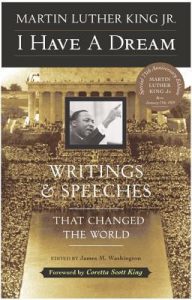 • I have a dream: writings and speeches that changed the world
• I have a dream: writings and speeches that changed the world
Martin Luther King, Jr.; foreword by Coretta Scott King; edited by James Melvin Washington.
E185.97.K5 A25 1992
On August 28, 1963, Martin Luther King Jr. stood in front of the Lincoln Memorial looking out over thousands of troubled Americans who had gathered in the name of civil rights and uttered his now famous words, “I have a dream . . .” It was a speech that changed the course of history.
This anniversary edition honors Martin Luther King Jr.’s courageous dream and his immeasurable contribution by presenting his most memorable words in a concise and convenient edition. As Coretta Scott King says in her foreword, “This collection includes many of what I consider to be my husband’s most important writings and orations.” In addition to the famed keynote address of the 1963 march on Washington, the renowned civil rights leader’s most influential words included here are the “Letter from a Birmingham Jail,” the essay “Pilgrimage to Nonviolence,” and his last sermon, “I See the Promised Land,” preached the day before he was assassinated.
Editor James M. Washington arranged the selections chronologically, providing headnotes for each selection that give a running history of the civil rights movement and related events. In his introduction, Washington assesses King’s times and significance.
